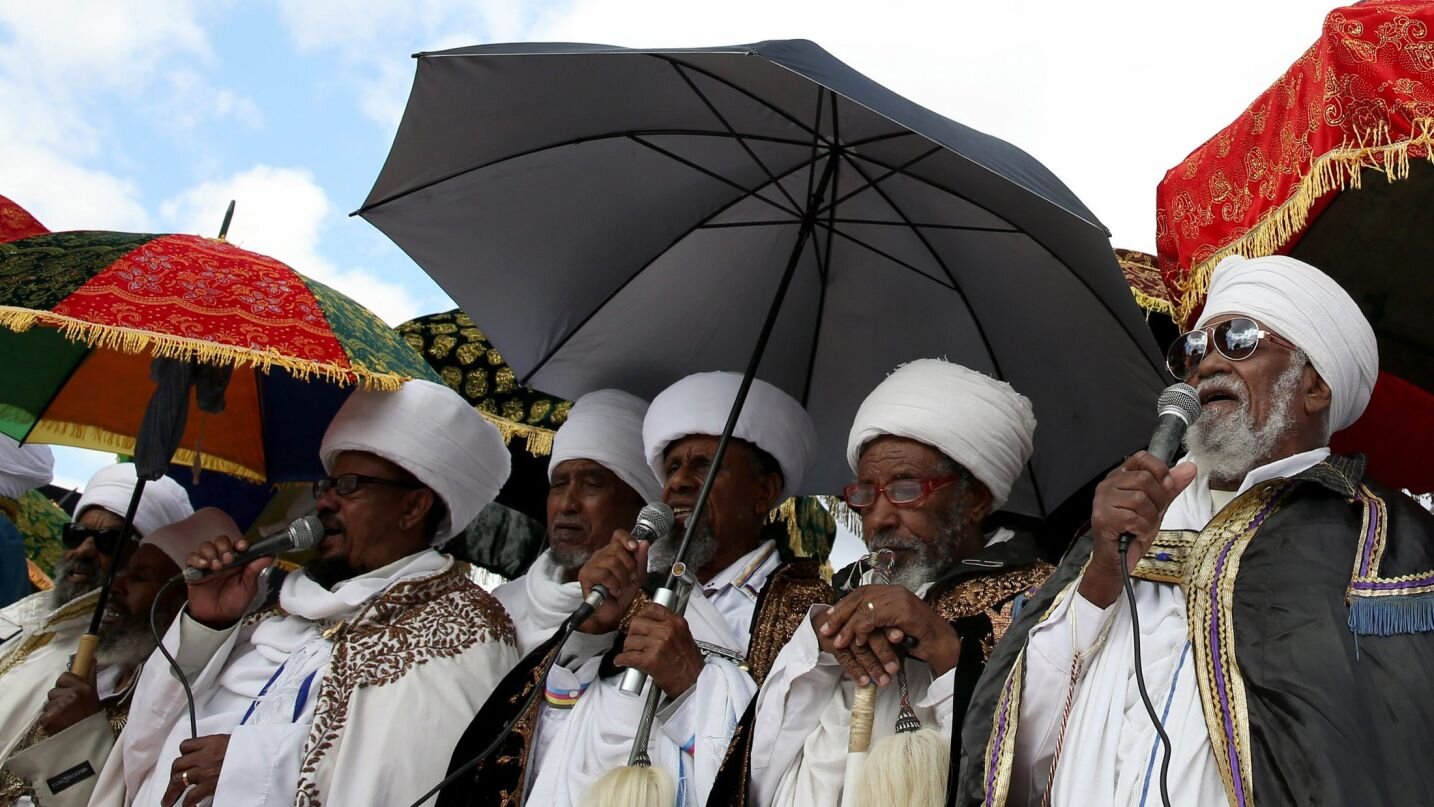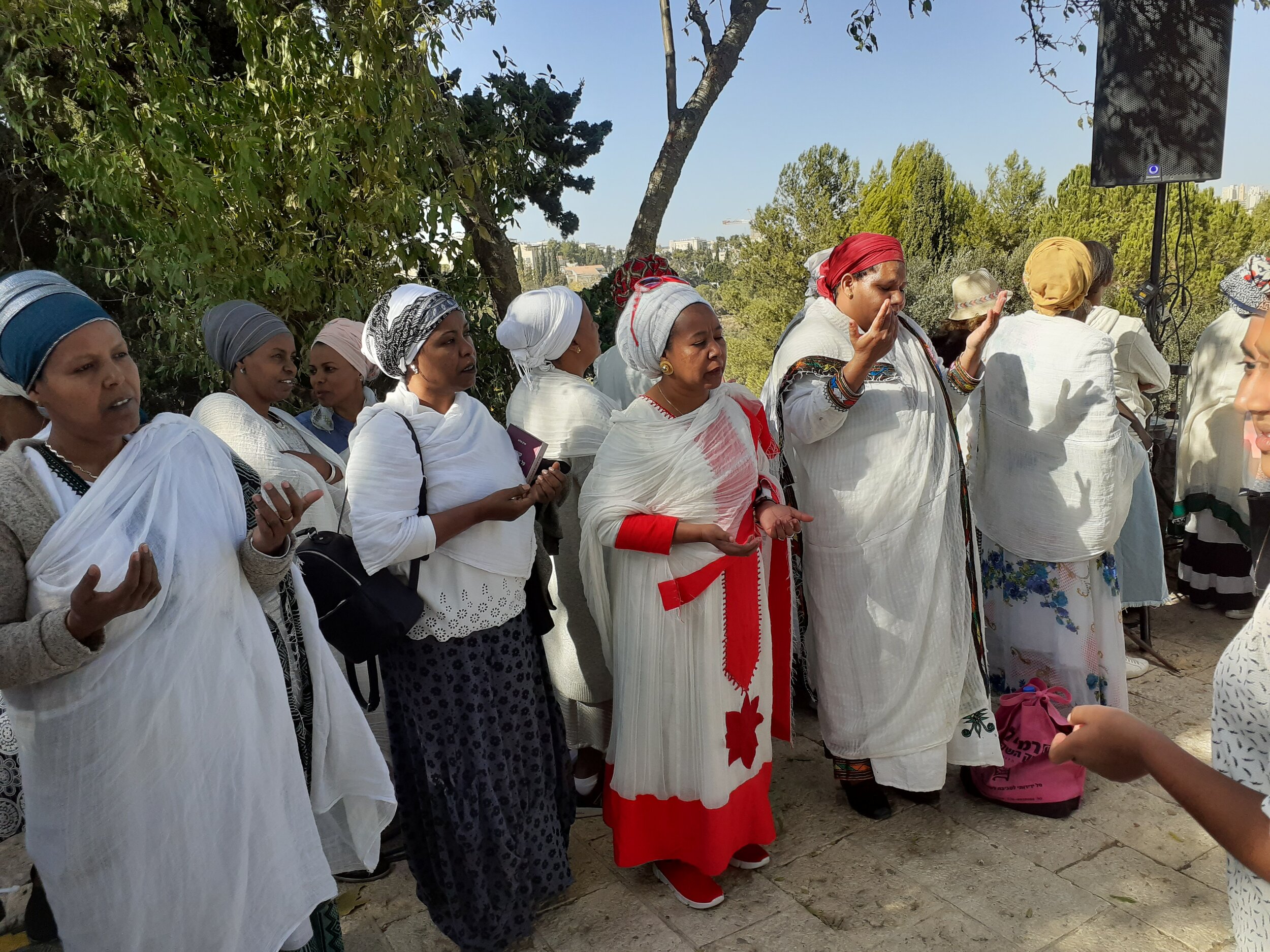Ethiopian Jews celebrate their return to Jerusalem, yearn for more acceptance
Kessim, the title for Ethiopian Jewish religious leaders, stand with their traditional robes and parasols. Photo by Gil Zohar.
JERUSALEM — An estimated 125,000 Ethiopian Jews, a third of the community in Israel, gathered on the Haas promenade overlooking Old Jerusalem last week to witness a priestly blessing for a festival called Sigd.
Old men wore their traditional colorful robes, while teenagers could be seen texting on their cellphones in Israel Defense Force (IDF) khaki and skin-tight jeans that their ancestors in Ethiopia would disapprove of. The diversity in the community represents Israel’s own rapid rise from rural pre-modernity to a postmodern start-up nation.
The oldest in attendance remember hiking up mountain tops above their villages in Ethiopia for mass prayers, yearning for Zion, the Jewish promised land. Through a series of military operations, many Ethiopian Jews have escaped persecution to live in Israel. Their journey is similar to the biblical story in Nehemiah of the return of the Jews from Babylonian exile 2,600 years ago.
Sigd, from the Hebrew word for prostration sgida, celebrates the renewal of the covenant between God and the Jewish people that they would return to their land. The gathering takes place 50 days after Yom Kippur, just as the holiday of Shavuot (Pentecost) is celebrated 50 days after Passover.
Today the holiday has morphed into a day of thanksgiving for the Ethiopian Jews’ rescue from religious persecution, as well as their gratitude for the Torah and their cultural heritage.
The central event of the Sigd celebration is the priestly blessing by the kessim in Geez, the sacred language used by Ethiopian Jews in their liturgy. Amharic, their traditional language, has been widely displaced today by Hebrew.
History of Jews in Ethiopia
The ancient community may date back to King Solomon and his alliance with the Queen of Sheba 3,000 years ago.
Jews have lived in Ethiopia from before the destruction of the First Temple in 586 BCE when the Babylonians ruled the Jewish holy land, what’s now Israel. The Ethiopian Jews, called Beta Israel, considered themselves descendants from the tribe of Dan, one of the 10 lost tribes out of Israel’s 12 that were exiled by the Babylonians. Many were compelled to convert to Christianity in the 19th and 20th centuries but the community continued to dream and pray for a return to Jerusalem.
Starting in 1973, the Beta Israel suffered terribly under the dictator Col. Mengistu Haile Mariam. When Israel became aware of their plight, significant investigation and research was done leading to a rabbinic ruling that accepts the Ethiopian Jews as part of the Jewish nation, entitling them to emigrate to Israel under the Jewish state’s Law of Return. That paved the way for 8,000 Beta Israel to move to Israel. But then Mengistu forbade the Jews to leave Ethiopia. That led to the decision to covertly bring them to Israel. The 2019 Netflix movie The Red Sea Diving Resort recounts one such espionage rescue operation.
Women pray during the Sigd festival on the Hass promenade in Jerusalem Nov. 27. Photo by Gil Zohar.
Yearning for Jerusalem, in Jerusalem
Ethiopian chief rabbi in Israel Reuven Wabshat said that after the mass immigration of Ethiopian Jews to Israel, the community decided to continue celebrating the holiday, even though its essence is about the yearning to return to Jerusalem. This was so that Ethiopians would not forget the “powerful heritage of Ethiopian Jewry” and to help Israeli society understand the challenges experienced by the Ethiopian Jewish community throughout their history in Africa and even now in Israel.
“We missed Jerusalem for thousands of years,” Rav Yosef, a teacher in the community, said. “Today, in Jerusalem, we celebrate... but just as we say, 'Next year in Jerusalem' at the Passover seder, so too at Sigd we pray for a rebuilt Jerusalem.”
For Ziva, a shy 20-year-old from Ashkelon with dark braided hair, the Sigd celebration is a significant milestone. “I feel like it’s a day of unity for us.”
For the young woman who arrived in Israel with her parents 12 years ago, the observance of the ancient holiday reminds her that “there's so much to remember...”
Dignifying the celebration with the government’s seal of approval, Knesset Speaker Yuli Edelstein, and Culture and Sport Minister Miri Regev both spoke, while President Reuven Rivlin delivered a video message.
Rabbi Wabshat also said it is crucial for broader Israeli society to understand the Ethiopian Jewish community’s heritage and that it is an integral part of the Jewish people because of the “difficulties” the community has experienced in Israel: discrimination and racism. The community has suffered from over-policing and a disproportionate number of arrests and indictments relative to its population.
The recent death of Solomon Tekah, killed by a ricochet following an altercation between a group of youths and a police officer, led to renewed claims of police brutality, as well as protests and riots by members of the Ethiopian community.
A previous bout of protests was sparked when video footage emerged of police officers beating an IDF soldier from the Ethiopian Jewish community.
“As you know, in recent years, the Ethiopian Jewish community has had difficult experiences, because people do not know and do not appreciate what Ethiopian Jews went through, and looked at things which are not relevant such as differences in place of origin, but not the internal aspects of Ethiopian Jewry,” said Wabshat.
“The Sigd holiday can bring people to the understanding and recognition that Ethiopian Jews are of the same flesh as all Jews around the world, and when the state recognizes Sigd, as it has, it means that we can all be one people.”
Rav Yosef, a teacher in the community, explained the Ethiopian Jewish engagement and wedding ceremonies and asserts that their practice conforms to the Mishnaic description in Tractate Kiddushin (part of the Oral Law) of what constitutes proper Jewish betrothal. The community has always preserved its ritual status as Jews, he insists.
Uniting Jews
Member of Knesset Pnina Tamano-Shata described the holiday as “a big gift for Israeli society” since, she said, it could help unite the Jewish people.
“It is so wonderful to see so many people here who are not from the Ethiopian community, and this holiday has become a holiday for all the Jewish people,” said Tamano-Shata.
“It is celebrated in kindergartens, schools, in the army, in local authorities, and the message is that this story is your story, it’s my story, and the story of all Jews, whether from Europe or from Arab countries,” she said.
Tamano-Shata also said that the identity of the Ethiopian Jewish community was strong, despite the problems it has faced, including police violence, discrimination, and racism.
“We are positive and fully open to Israeli society, we are not in a place of antagonism even though we have had a very hard, challenging, and intensive year, and we are far from getting justice, nevertheless everything has its time and period,” she said.
Michal Avera Samuel, director of the NGO Fidel, said that the thousands of people who came to the celebrations in Jerusalem came “to learn and understand the heritage of Ethiopian Jews, which is an ancient heritage which every child should be proud of and pass on to the next generation.”
“The goal is that through studying in school and youth groups, we can teach the heritage of Ethiopian Jews and build a courageous identity together with a sense of belonging within Israeli society,” Samuel said.
Gil Zohar is a Jerusalem-based reporter for Jerusalem Post and correspondent for Religion Unplugged.


